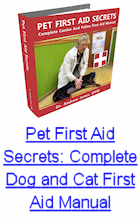|
Hi Friend,
A happy Wednesday to you and your family.
Poisonings were one of the more common reasons I was called in for emergencies.
And they are so much easier to prevent than treat.
If you have YET to get a copy, I suggest you have a look at my MANUAL of Pet First Aid.
You can grab your copy here:
http://www.petfirstaidsecrets.com
I have seen dogs and cats poisoned by virtually everything: Rat poison, slug bait, salt, chocolate, grapes, marijuana, compost, mushrooms, drain cleaner, antifreeze, even chewing gum
The list is rather exhaustive: it's really hard to believe just HOW many things can be toxic.
Take for instance a small dog called Bessie. She was a West Highland White Terrier ( Westie), who had a fondness for things that drop to the floor..

Full of life, into chasing things that moved, and definitely in LOVE with food...
Her owner came home one day and noticed that her purse had been 'ravaged'
And as they say in Scotland: A 'wee' bit of gum was gone...
In general you would NOT worry.
BUT...she reacted to the artificial sweetener in the gum ( the xylitol), and became extremely weak.
She was laying on the floor NOT moving, then began to seizure.
Fortunately her owner rushed her in to the clinic, was able to say WHAT she had eaten, and I was able to contact poison control and get specifics as to HOW to treat her.
She had extremely LOW blood sugar and LOW potassium
The treatment was IV fluids, dextrose, and potassium-
She fully recovered, BUT not every dog does..And all this from chewing gum.
This was wonderful for her owner, and very rewarding for me :-)
My BIG point in all of this is for you to be AWARE of some of the common toxins, and PREVENT your pet from ever ingesting them in the first place.
------------------------------------------------------------
Here is my fairly complete list of common food toxins:
------------------------------------------------------------
Avocado
Avocado leaves, fruit, seeds and bark contain a toxic principle known as Persin. The Guatemalan variety is most toxic – but all have toxic potential. They cause vomiting/diarrhea – primarily gastrointestinal distress.
Chocolate (all forms)
Chocolate contains theobromine, a compound that is a cardiac stimulant and a diuretic.
Signs:
Initial excitation.
Increased drinking and urinating.
Vomiting and Diarrhea.
Theobromine causes an increased heart rate and arrhythmia –.
Seizures can then be seen.
Death is then possible.
ACTION PLAN: Induce vomiting, give activated charcoal, and go to the Vet if depression and seizures begin. Baker’s chocolate and high cocoa content chocolate is the most toxic; the toxic dose is 2 baking squares for a 10lb dog. Regular chocolate bars have little real chocolate and are seldom toxic.
Coffee (all forms)
Coffee contains dangerous components called xanthines, which cause nervous system or urinary system damage and heart muscle stimulation
Fatty foods
The primary concern here is severe gastrointestinal upset- and in some cases Pancreatitis.
This can be fatal in some pets- and it is ALMOST always triggered by a High Fat Meal, such as gravy or bacon.
Macadamia nuts
Macadamia nuts contain an unknown toxin, which can affect the digestive and nervous systems and muscles of dogs. This has lead to paralysis. A small number of nuts and even the butter can cause this.
Moldy or spoiled foods
Many molds contain a type of toxin called an Aflatoxin. This is thought to be a common cause of “compost toxicity”. Signs include GI (Vomiting/Diarrhea), muscle tremors, in-coordination, elevated temperature, excessive salivation, and liver damage. Avoid feeding ANYTHING moldy to your dog or cat.
Onions, onion powder
Onions contain the toxic ingredient thiosulphate.
Pets affected by onion toxicity will develop anemia. 1 Onion can cause this. Fortunately ALL dogs recover once they are stopped from ingesting onions.
Raisins and grapes
As few as 6 grapes and raisins have caused acute kidney failure in some dogs.
The toxic ingredient is not yet known.
There is no treatment.
AVOID feeding ANY grapes or raisins to your dogs.
Yeast dough
The yeast dough/uncooked bread dough will rise in your pet’s stomach causing severe gastrointestinal distress (vomiting/diarrhea), bloating, and signs of alcohol toxicity.
Xylitol
Xylitol is a artificial sweeter found in “SUGAR FREE” Products, such as gum, candy etc.
Signs relate to a sudden drop in glucose (blood sugar), in-coordination, collapse and seizures.
Avoid feeding any gum/candy to your pets.
Apples, Apricots, Cherries, Peaches and Plums.
Ingestion of large amounts of stems, seeds and leaves of these fruits can be toxic.
They contain a cyanide type compound and signs of toxicity include apprehension, dilated pupils, difficulty breathing, hyperventilation and shock.
Note – it’s the seeds and stems that contain the toxic component, not the fruit itself.
Potato peelings and green looking potatoes
Potatoes and other Solanum species, including the tomato, are members of the nightshade family of plants.
These plants contain solanine and other toxic alkaloids which, if eaten in large enough amounts, can produce drooling, severe gastrointestinal upset, including vomiting and diarrhea, loss of appetite, drowsiness, central nervous system depression, confusion, behavioral changes, weakness, dilated pupils and slowed heart rate.
Nutmeg
High levels of nutmeg can be toxic, even fatal.
The toxic component is unknown.
Signs of toxicity include tremors, seizures, nervous system abnormalities or death.
Tomato leaves & stems (green parts)
The green parts of the tomato plant are considered toxic because they contain solanine, which has the potential to produce significant gastrointestinal and central nervous system effects.
Heal Your Pet At Home!
Best Wishes,
Dr Andrew Jones, DVM
P.S. WHAT to do IF your pet has eaten any of these toxic foods:
TO YOUR VETERINARIAN. If your pet is showing signs of ingesting a poison, it is important that your veterinarian examines her and treated appropriately. Some toxins can progress and lead to severe seizures. If you suspect antifreeze poisoning, it must be treated within 4-6 hours, before irreversible kidney damage occurs.
PURGE THE POISON. In most cases of poisoning, getting your pet to vomit is the most important thing that you can do. DO NOT INDUCE VOMITING if something caustic has been consumed (such as drain cleaner or bleach). To induce vomiting, give hydrogen peroxide at 1 teaspoon per 10 lbs of body weight. If your pet doesn’t vomit in 10 minutes, repeat again. NEVER do more than 2 treatments of peroxide. You can also try salt: dilute 1 teaspoon of salt in a tablespoon of water per every 10lbs of body weight.
DELAY ABSORPTION. Activated charcoal is readily available at most pharmacies. It delays absorption of any toxin by binding to the toxic compound in the stomach. The easiest way is to give the capsule form. For those garbage-eating dogs (such as my own dog) it is a good idea to have hydrogen peroxide and activated charcoal always on hand.
PREVENTION. Ensure medications are always out of mouth’s reach. Become familiar with toxic plants (visit http://www.aspca.org/toxicplants for a complete list) and remove those from your house, if your pet is a plant-eater. Keep your compost covered.
P.P.S. You should be PREPARED for ALL the common dog and cat emergencies.
It's just good common sense pet care skills all pet owners should have.

My Manual of Pet First Aid is a great resource you should have.
And you can get a copy here:
http://www.petfirstaidsecrets.com

DISCLAIMER: This information is for educational purposes only and is not intended to replace the advice of your own veterinarian. Dr Andrew Jones resigned from the College of Veterinarians of B.C. effective December 1 2010, meaning he cannot answer specific questions about your pet's medical issues or make specific medical recommendations for your pet.
PRIVACY POLICY: We will never rent, sell, loan, provide, barter, exchange or in any way make available your personal information to others. You can unsubscribe or change your email address at any time using the links at the bottom of this email.
Copyright 2013 Four Paws Online Ltd.
Tel: 1-800-396-1534
Fax: 1-888-398-1378
www.theonlinevet.com
support@fourpawsonlineltd.com
|